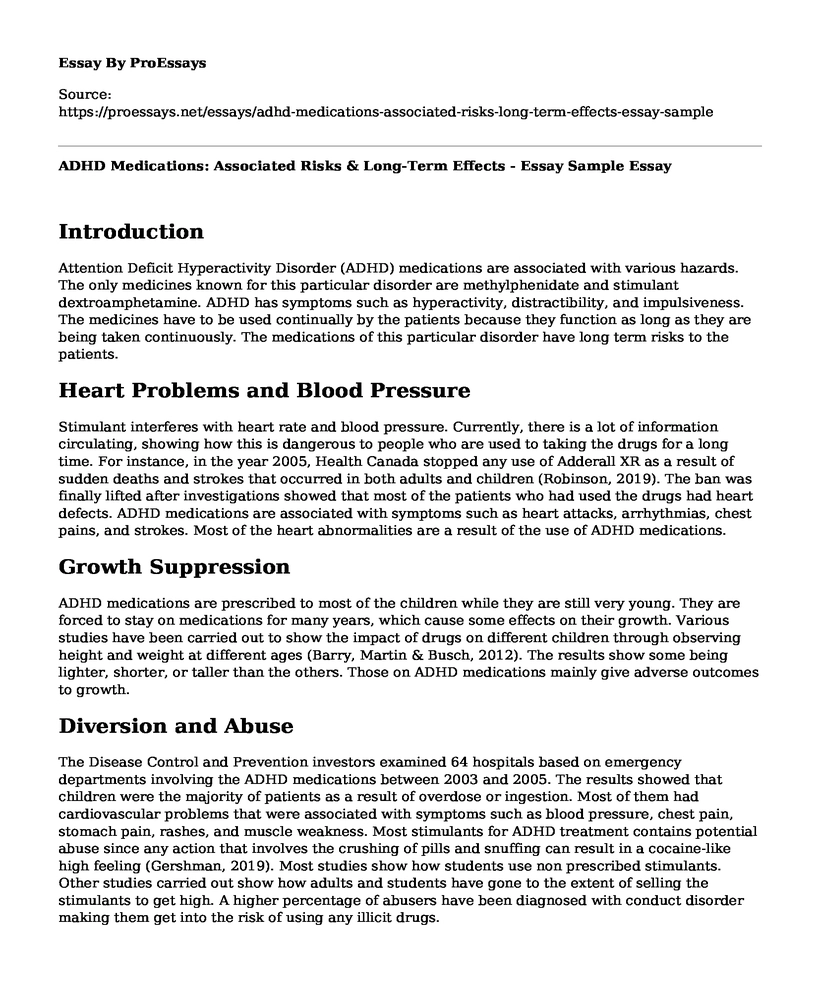Introduction
Attention Deficit Hyperactivity Disorder (ADHD) medications are associated with various hazards. The only medicines known for this particular disorder are methylphenidate and stimulant dextroamphetamine. ADHD has symptoms such as hyperactivity, distractibility, and impulsiveness. The medicines have to be used continually by the patients because they function as long as they are being taken continuously. The medications of this particular disorder have long term risks to the patients.
Heart Problems and Blood Pressure
Stimulant interferes with heart rate and blood pressure. Currently, there is a lot of information circulating, showing how this is dangerous to people who are used to taking the drugs for a long time. For instance, in the year 2005, Health Canada stopped any use of Adderall XR as a result of sudden deaths and strokes that occurred in both adults and children (Robinson, 2019). The ban was finally lifted after investigations showed that most of the patients who had used the drugs had heart defects. ADHD medications are associated with symptoms such as heart attacks, arrhythmias, chest pains, and strokes. Most of the heart abnormalities are a result of the use of ADHD medications.
Growth Suppression
ADHD medications are prescribed to most of the children while they are still very young. They are forced to stay on medications for many years, which cause some effects on their growth. Various studies have been carried out to show the impact of drugs on different children through observing height and weight at different ages (Barry, Martin & Busch, 2012). The results show some being lighter, shorter, or taller than the others. Those on ADHD medications mainly give adverse outcomes to growth.
Diversion and Abuse
The Disease Control and Prevention investors examined 64 hospitals based on emergency departments involving the ADHD medications between 2003 and 2005. The results showed that children were the majority of patients as a result of overdose or ingestion. Most of them had cardiovascular problems that were associated with symptoms such as blood pressure, chest pain, stomach pain, rashes, and muscle weakness. Most stimulants for ADHD treatment contains potential abuse since any action that involves the crushing of pills and snuffing can result in a cocaine-like high feeling (Gershman, 2019). Most studies show how students use non prescribed stimulants. Other studies carried out show how adults and students have gone to the extent of selling the stimulants to get high. A higher percentage of abusers have been diagnosed with conduct disorder making them get into the risk of using any illicit drugs.
Some ADHD medications are associated with the risks of psychosis. The increase in the risk of psychosis is among young youths and adolescents. ADHD medications have become common among college students, which have become a significant problem. The ADHD medication prescriptions to the students may cause psychosis. This might be even serious to patients with historical mental disorders. When patients are newly prescribed to ADHD medications, they tend to have signs and symptoms such as agitation, hallucinations, aggression, and delusions associated with psychosis.
Critique
The pharmacist has a significant role to play in ADHD medications to prevent further injuries t the patients. They are supposed to choose the best medicines for treating ADHD instead of using stimulants that cause significant problems to patient health. They should also conduct effective counseling to the patients appropriately on ADHD medications ensuring that the safety concerns remain intact. The pharmacist should also conduct further studies on ADHD drugs and compare the ones with less adverse effects. College students should be educated on the risk of abusing the ADHD medications, and proper measures should be taken to control any abuse of such medications
References
Barry, C. L., Martin, A., & Busch, S. H. (2012, September). ADHD medication use following FDA risk warnings. Retrieved from https://www.ncbi.nlm.nih.gov/pmc/articles/PMC3896970/
Gershman, J. (2019). Study: Certain ADHD Medications May Increase the Risk of Psychosis. Retrieved 3 March 2020, from https://www.pharmacytimes.com/contributor/jennifer-gershman-pharmd-cph/2019/03/study-certain-adhd-medications-may-increase-the-risk-of-psychosis
Robinson, L. (2019). ADHD Medications. Retrieved 3 March 2020, from https://www.helpguide.org/articles/add-adhd/medication-for-attention-deficit-disorder-adhd.htm
Cite this page
ADHD Medications: Associated Risks & Long-Term Effects - Essay Sample. (2023, Apr 12). Retrieved from https://proessays.net/essays/adhd-medications-associated-risks-long-term-effects-essay-sample
If you are the original author of this essay and no longer wish to have it published on the ProEssays website, please click below to request its removal:
- Afrocentric Perspective: Lack of Awareness and Resources on LBGT Suicidal Rates
- Essay Sample on Impact of Lifestyle Choices on Health
- Personality: Nature vs Nurture: The Debate Over Development - Research Paper
- Jenny's PTSD, Baby's Cleft Lip: Impact on Mental Health of New Mother - Essay Sample
- Essay Example on OCD: Obsession, Compulsion and Cognitive Disorder
- Paper Example on Compulsory Admissions of Psychiatric Patients: A Multiple-Case Study
- Free Essay on Online Dating and Traditional Dating







